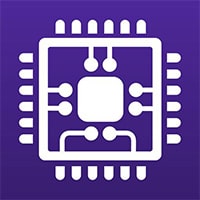CPU Z is a freeware system profile and monitoring tool for Microsoft Windows and Android that can identify a contemporary computer’s CPU, RAM, motherboard chipset, and other hardware components.

What is CPU Z
It is a freeware program from CPUID that finds details about your computer’s motherboard, processor, RAM, and graphics card. The program thoroughly reports your machine’s hardware performance and specs.
Users may upload their system information and performance statistics to the online CPU Z database. Users can upload the results file with the .cvf file extension to CPU Z to contrast their computer’s performance with other machines. Additionally, it analyzes the data to compile a Hall of Fame for the fastest and most effective systems.
Features of CPU Z
(CPU 1) CPU tab
You may find details about your computer’s CPU under the CPU tab, including its name, multiplier, number of threads, socket number, power use, technology, pulse rate, etc.
CPU Z’s Mainboard tab (MAINBOARD 2)
When upgrading or changing components, you may find a lot of helpful information on the Mainboard page. The motherboard manufacturer, chipset, BIOS, and graphical user interface are all included in this data.
CPU Z’s Memory tab (MEMORY 3)
This tab is also beneficial since most people find that increasing RAM makes their computers run faster. The picture above shows that our test machine has 2GB of internal memory (2048 MB). This memory operates in dual channel mode and is DDR memory (as opposed to DDR2 or DDR3). For sophisticated users, most of the additional information is under this tab. More overclocking-related material will be found.
CPU Z’s SPD tab (SPD 4)
You may need to think about additional information to perform the RAM update. The one that has the details you need to concern is the SPD tab. Here, you may see information on each memory stick in each motherboard slot. The chip’s size, kind, and operating frequency are all visible. In addition, dependent on the setup, a timeline shows specific information.
Graphics tab in CPU Z (GRAPHICS 5)The most fundamental details regarding GPU, such as name, manufacturer, and GPU Tech, are provided on the graphics tab. You may use a unique GPU-Z program to examine the graphics card closely.
CPU Z’s Bench tab (BENCH 6).
By conducting a brief test, this page will inform you of the CPU benchmark for your machine. After it has finished running, you may pick in the blue Reference box to get the comparison between your CPU and others. The result will be converted to percent so you can readily compare when you check the box next to the Reference in black.
How to download CPU Z
If you’re using Windows, here are the instructions for downloading and installing:
- Get the latest version from CPU Z Download site
- Now, on the left side, click the pink SETUP or ZIP boxes.
- To get the installation file, choose the SETUP option.
- Select the.exe file after the download is complete to launch the setup program.
- To finish the setup, do as instructed.
FAQ
What hardware information is provided by CPU Z?
CPU Z provides comprehensive information on a computer’s hardware, including information about the processor, graphics card, RAM, and motherboard. The provided data lets you discover frequencies, voltages, precise models, and more.
Is the data shown by CPU Z accurate?
Yes, The data provided by CPU Z may be trusted unconditionally. Verifying proper overclocking of a component is possible. You may learn the precise model number of the item in question. Check the chipset to find out whether your motherboard supports a CPU upgrade.
Can you use CPU Z?
Yes, The French business CPUID created CPU Z, a piece of software that is quite beneficial. Because its database is constantly updated, It supports most CPUs and motherboards, allowing you to learn about the hardware specifications of ancient and very recent machines.
Is it safe?
The application CPU Z is safe. It does not let you alter parameters that might cause instability in your system, such as voltages or frequency ranges, and offers information on your computer’s hardware. The stress test under the Benchmark section, however, might raise the temperature of your PC.